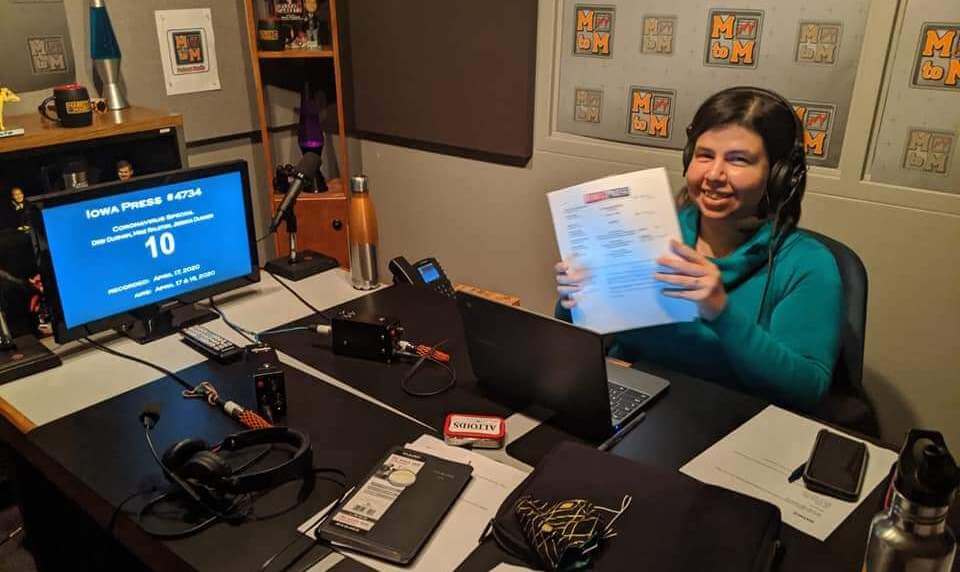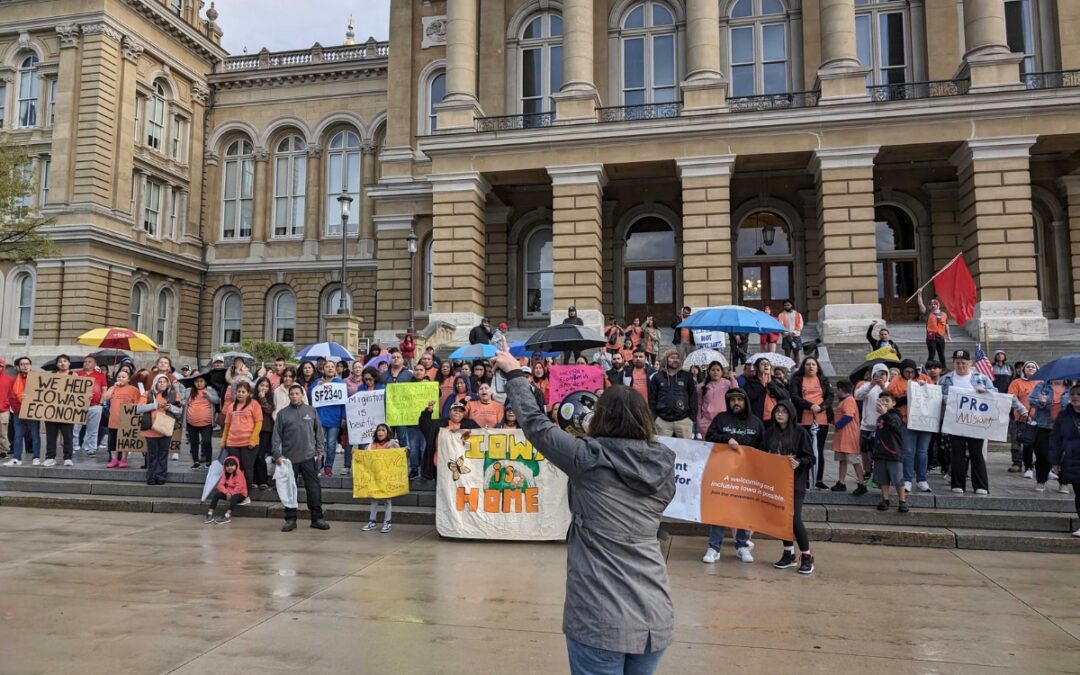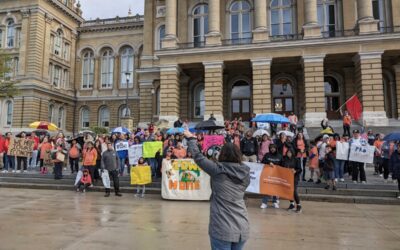
Vanessa Marcano-Kelly of Des Moines played a key role during the pandemic as one of the Spanish interpreters for Gov. Kim Reynolds’ daily news conferences, making sure Spanish-speaking Iowans stayed informed on the public health situation.
Fluent in English, Spanish, and French, the Venezuela native is the owner of Caracas Language Solutions LLC, an interpretation and translation business. Other high-profile leaders Vanessa has worked with include US senators Elizabeth Warren and Bernie Sanders, and US Transportation Secretary Pete Buttigieg.
“Iowa saw some of the worst COVID-19 outbreaks in meatpacking and food processing plants, whose workforces are largely made up of immigrant or refugee non-English speaking individuals,” Vanessa said.
“All of the emergency declarations and safety measures were being issued in English, so many communities had very little access to current, accurate information during an unprecedented time.”
[inline-ad id=”5″]
Vanessa worked with state departments, Iowa PBS, and Spanish-language media to ensure Iowa’s Spanish-speaking populous had access to the same information as those whose primary language is English.
Reynolds would stream her press conference on Facebook and thanks to Vanessa and the other translators, Iowa’s Latinos were able to participate in the conversation.
“Having the privilege to interpret this crucial information for people was an incredible experience that taught me so much about being flexible, adaptable, working as a team, and putting aside personal or even ideological differences to achieve the greater good of transmitting timely information to protect public health,” Vanessa said.
It took the 36-year-old a long time to get to where she is.
[inline-ad id=”0″]
Vanessa is the youngest of three children born in Caracas, Venezuela, to Hector and Mirna Marcano.
Her immigration journey has been complex, going back and forth between the United States and Venezuela throughout her life until 2008 when Vanessa was able to finally settle down in this country.
As the daughter of a father who was a surgeon and a mother who was a lawyer, Vanessa realized the many privileges she and her siblings enjoyed in their childhood given their family’s professional status.
However, the push for Vanessa and her family to leave Venezuela was the rising crime rates, the devaluation of the Venezuelan bolívar, the collapse of the banking system, and other factors.
Vanessa’s mother migrated to Florida with her and her middle brother, Jorge, in 1996, leaving her father and oldest brother, also named Hector, back in Venezuela.
[inline-ad id=”1″]
While attending a Christian school in Florida, Vanessa had to learn English quickly.
“Some people say that I have such a good accent in English,” Vanessa said. “Yeah, I tried to mimic kids’ accents because I didn’t want to get bullied, and even when people want to compliment my accent, they don’t realize it came out of fear, but on the other hand I was terrified of losing my Spanish; language is definitely something that’s part of my identity.”
After attending sixth-ninth grade in Florida, Vanessa returned to Venezuela with her mother and Jorge due to her father’s death. She finished high school in her home country and moved back to the United States to continue higher education.
Because Vanessa moved back and forth between the two countries so many times, she felt she was neither from there nor here and thought coming back to the United States would help with that.
After the 2002-03 financial crisis in Venezuela, which led to a government-imposed currency exchange control to avoid capital flight, Vanessa’s family was unable to make college tuition payments.
[inline-ad id=”2″]
Vanessa made the decision to move near Detroit, Michigan, to study at a community college. Given the lack of access to funds from Venezuela due to the exchange control, Vanessa and her family had to rely on her brother Hector’s medical residence salary and tighten their belts to make do.
“Coming from privilege back home and making all those changes made me aware of all the privilege I had, and all the inequality and unfairness people had to put up with,” Vanessa said.
Money was tight and Vanessa felt forced to return to Venezuela where she began to attend college and study journalism. Her motivation to change fields of study was sparked as she began to question how people believe the media’s narrative.
In 2008, after seven semesters of journalism, bleak job prospects, and once again unsustainable crime rates in Caracas, Vanessa decided to return to Michigan to finish her associate’s degree. From there, she transferred to South Dakota State University for her bachelor’s of arts since it offered the most affordable international student tuition.
[inline-ad id=”3″]
After graduating from SDSU with a degree in global studies and French in 2011, Vanessa applied for a community organizer position with Iowa Citizens for Community Improvement (CCI) in Des Moines.
Iowa’s capital city became her new home in 2012. It was in Des Moines where she learned about the different Latino immigrant communities in Iowa compared to those in Florida.
“In Iowa, you really see the reality of immigration and the movement of labor from Mexico and Central America to the US and the rural areas of the country,” Vanessa said. “In contrast in South Florida, you see a different type of immigrants; it’s more a professional class, with very different backgrounds and different countries with a different mentality.
“And that’s also why you see the big political ideology difference, because of what these immigrants that are in Florida have gone through in their countries, whereas a lot of the immigrants you see in Iowa historically is people who have been displaced directly because of bad US economic policies such as NAFTA, or the war on drugs which has generated horrible gang violence in these countries.”
[inline-ad id=”4″]
In her community organizing job, Vanessa started interpreting for the same people she was trying to empower.
“I realized that interpreting is like you are people’s voice and you are that channel and I loved that,” she said.
To hone her skills, Vanessa earned a certificate in judiciary interpretation and translation from Des Moines Area Community College in 2015.
“Seeing how people underestimate someone’s intelligence because they don’t speak the same language and witnessing how people would underestimate my mom’s intelligence because she didn’t speak English, or because she spoke with an accent, I would think, ‘You don’t know how smart this woman is,’” Vanessa said.
“So that basic injustice of the world made me mad and also my parents telling me to remember people who have less and who are not as fortunate.”
[inline-ad id=”5″]
Not everything was community organizing and interpreting for Vanessa. She met her now-husband Michael Kelly—“Miguelito” as she refers to him—in 2012. Michael’s a US Army veteran from Iowa with a degree in political science who self-identifies as a feminist and, according to Vanessa, he was like finding a needle in a haystack.
Vanessa left CCI in 2014 to work for the Iowa Department of Human Services. About a year later—after passing the Iowa Judicial Branch court interpreter certification exam—she left her state job and started Caracas Language Solutions LLC.
Her past as an organizer influences the work she does today. Vanessa said the language barrier leads to a lot of people being exploited.
“Some English-speaking or bilingual employers think people are stupid or less and they think it is easy to prey on them and there’s a lack of access to information in their own language and it creates huge inequalities,” Vanessa said.
“It takes people’s agency to be able to do things on their own. So if I’m able to be there because I have this skill, I had this privilege to acquire this skill, that’s what I can do to level the field so people can communicate for themselves, without putting myself in danger of burnout that sometimes comes from nonprofit work.”
By Claudia Thrane
08/19/21
[inline-ad id=”1″]
UPDATE (Aug. 19, 2021, 1:46 p.m.): There was clarification on Marcano-Kelly’s reason for migration.

VIDEO: Hampton businesses targeted with anti-immigrant flyers
Earlier this month, the Latino community in Hampton, Iowa was rocked by what locals are calling a hate crime: employees of Latino-owned businesses...

Immigrant Iowans, major ag workforce, wonder if they should stay here
by Mónica Cordero, Investigate Midwest/Report for America Leer en español Having spent more than half her life in Waterloo, Iowa, she has built a...

Opinion: In the wake of Tyson, let’s rethink Iowa’s immigration stance
In Iowa, we often pride ourselves on our resilience and self-reliance. However, the truth is our state's prosperity heavily depends on, both...

The fight against ‘clearly unconstitutional’ Iowa immigration law
Recent Iowa immigrants and allies are still fighting against an Iowa immigration law they say unfairly discriminates against and targets them....

Advocates file suit to stop Iowa’s ‘unconstitutional’ immigration law
Immigration advocates filed a federal lawsuit Thursday to stop Iowa’s new immigration law—SF 2340—from taking effect arguing that the legislation...

Iowa Latinos rally to oppose new ‘unjust’ law targeting their community
Iowa's new anti-immigrant law is based on a Texas law that some argue is unconstitutional Jose Alvarado wasn’t shocked when Republicans in the Iowa...




